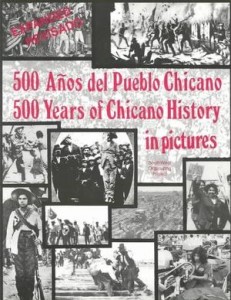This week, the U.S. District Court for Arizona began hearing arguments in Acosta et al v. Huppenthal, a case that might determine the fate of Tucson’s embattled Mexican American Studies program.
The Mexican American Studies program fell victim to House Bill 2281, an Arizona state law written specifically to target the program. The law makes it illegal to teach classes that “promote resentment toward a race or class of people” and “are designed primarily for pupils of a particular ethnic group.” Despite independent audits of the program, which found that it didn’t violate the law and in fact improved student performance, Tucson was forced to shut down the MAS program or face a loss of funding. Several books by Mexican American and Native authors were seized from classrooms.
CBLDF was among several organizations that condemned the dissolution of the MAS program. The Fund also joined a Freedom to Read Foundation amicus brief in the case. CBLDF joined the brief because any legislation that bans books based on the ethnicity of their creators or subject matter is just as likely to ban comic books for the same reason. If images of works by Frida Kahlo, Diego Rivera, or other Chicano artists can be banned (as was done with the removal of 500 Years of Chicano History in Pictures), it doesn’t seem so far fetched that works by the Hernandez Brothers and other Mexican American and Latino comics creators would become part of Arizona’s censorship spree.
In 2015, the Ninth Circuit Court of Appeals laid the groundwork for the current hearings by determining that sections of the law were in violation of the First Amendment or raised constitutional concerns under both the First and 14th Amendments (equal protection). While the Ninth Circuit did not strike down the law outright, they did send the decision back to the district court for reconsideration because the prior court had ruled against the plaintiffs on three of the four subsections, dismissing most of their First Amendment claims without evaluating the discriminatory nature of the law.
Over the next two weeks, U.S. District Judge A. Wallace Tashima, who has previously upheld the law, will hear arguments in the case. Huppenthal, the former state superintendent of schools in Arizona, is a noted opponent to the MAS program who campaigned on a platform vowing to stop “la Raza,” a term synonymous with Latinos in the American Southwest. One of Huppenthal’s arguments against the program is that “To get the message that you’re oppressed or that you’re a victim, I don’t think that’s a healthy message to have about everything.” Huppenthal has also reportedly adopted pseudonyms to leave inflammatory comments online.
In the seven years that educators and freedom to read advocates have been battling on behalf of the program, some of the removed books have been allowed back into classrooms as supplemental materials for other courses. And in spite of Arizona’s attempt to stifle Mexican American literature, a number of states, including California and Texas, have adopted such programs.
According to Tony Diaz, who co-founded Librotraficantes, an organization that has “smuggled” copies of the books by Mexican American and Native authors into Arizona, “This un-American, discriminatory law was supposed to destroy our community. We found out about it and united in time to keep it from spreading the way Arizona’s anti-immigrant law spread.”
To celebrate the freedom to read, Remezcla recommended several banned books by Mexican-American writers, including the frequently challenged Bless Me Ultima by Rudolfo Anaya, Mexican WhiteBoy by Matt de la Peña, and Drown by Junot Diaz. You can view the full list here.
To view CBLDF’s prior coverage of the ban, click on the links below:
- Ninth Circuit Court Finds Constitutional Problems with AZ Law that Censored Mexican American Studies Program
- CBLDF Joins Amicus Brief Opposed to Arizona Law that Led to Ban of Mexican American Studies Books
- TUSD’s Lift of Book Ban Draws Ire of Arizona Department of Education
- Tucson School District Lifts Ban on Mexican American Studies Books
- Embattled Mexican American Studies Program Finds Another Way
- Court Upholds Law that Led to Tucson Book Ban
- Move by Tucson School Board May Mean Overturn of Book Ban
- Effort to Return MAS Books to Classrooms Fails in Tucson
- Tucson School District Blocks Renowned Chicana Author’s Visit
- Protestors Take Over Tucson School Board Meeting
- Tucson School Board Tightens Security
- Latino and Native Authors Keep Tucson Book Ban in the News
- Why Tucson Matters
- CBLDF Joins National Organizations in Condemning Arizona School Censorship
Help support CBLDF’s important First Amendment work in 2017 by visiting the Rewards Zone, making a donation, or becoming a member of CBLDF!
